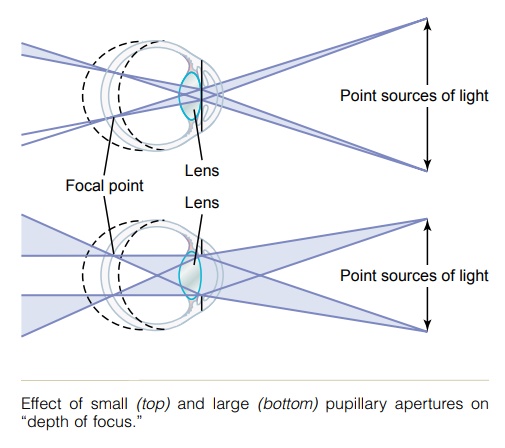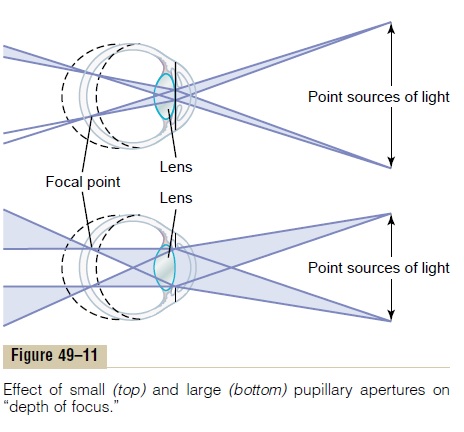Chapter: Medical Physiology: The Eye: I. Optics of Vision
Pupillary Diameter - Optics of the Eye

Pupillary Diameter
The major function of the iris is to increase the amount of light that enters the eye during darkness and to decrease the amount of light that enters the eye in day-light. The reflexes for controlling this mechanism are considered in the discussion of the neurology of the eye.
The amount of light that enters the eye through the pupil is proportional to the area of the pupil or to the square of the diameter of the pupil. The pupil of thehuman eye can become as small as about 1.5 millime-ters and as large as 8 millimeters in diameter. The quantity of light entering the eye can change about 30-fold as a result of changes in pupillary aperture.
“Depth of Focus” of the Lens System Increases with Decreas-ing Pupillary Diameter. Figure 49–11 shows two eyes thatare exactly alike except for the diameters of the pupil-lary apertures. In the upper eye, the pupillary aperture is small, and in the lower eye, the aperture is large. In front of each of these two eyes are two small point sources of light; light from each passes through the pupillary aperture and focuses on the retina. Conse-quently, in both eyes, the retina sees two spots of light in perfect focus. It is evident from the diagrams, however, that if the retina is moved forward or back-ward to an out-of-focus position, the size of each spot will not change much in the upper eye, but in the lower eye the size of each spot will increase greatly, becom-ing a “blur circle.” In other words, the upper lens system has far greater depth of focus than the bottom lens system. When a lens system has great depth of focus, the retina can be displaced considerably from the focal plane or the lens strength can change con-siderably from normal and the image will still remain

The greatest possible depth of focus occurs when the pupil is extremely small. The reason for this is that, with a very small aperture, almost all the rays pass through the center of the lens, and the central most rays are always in focus, as explained earlier.
Related Topics